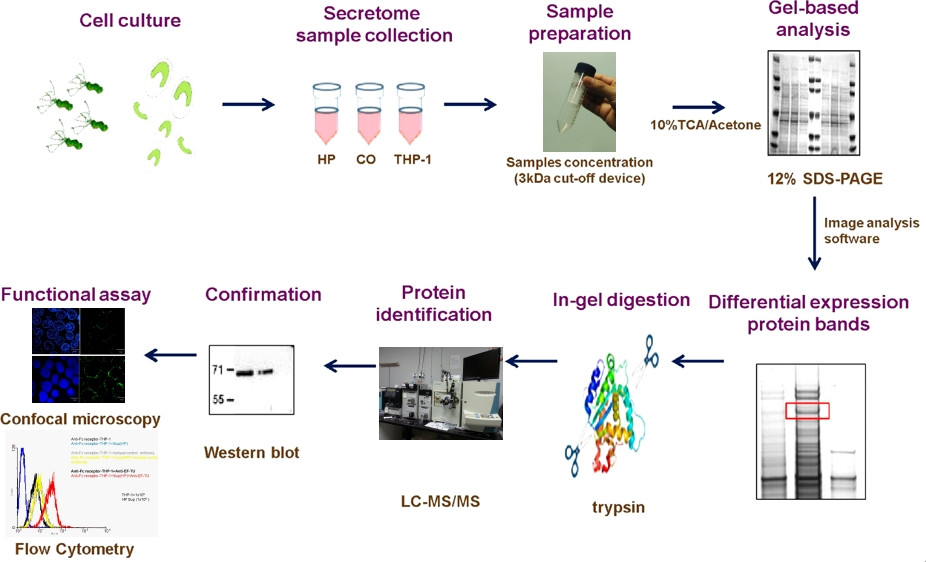Secretomics Analysis Service
Secreted proteins refer to proteins released by cells into the extracellular environment through secretory pathways, including cytokines, enzymes, receptors, hormones, and others. These proteins play critical roles in intercellular communication, immune regulation, tumor progression, and related processes. This service utilizes high-sensitivity mass spectrometry combined with enrichment and quantitative analysis of secreted molecules to systematically analyze secreted proteins in cell samples. It enables precise detection of protein types, abundances, and their potential roles in disease, and offers deep insight into functional changes of cells under different physiological and pathological conditions.
The secretomics analysis service is widely applied in cancer research, immunology, infectious diseases, neurodegenerative diseases, and drug development. By analyzing the expression changes of secreted proteins, it can be used to screen tumor-associated biomarkers, elucidate inflammation and immune regulation mechanisms, investigate signal transmission between neural cells, and assess the impact of drugs on secretory pathways, providing strong support for early disease diagnosis, mechanistic studies, and targeted therapy development.
Services at MtoZ Biolabs
Leveraging high-resolution mass spectrometry platforms, MtoZ Biolabs has launched the secretomics analysis service focusing on the analysis of secreted proteins in samples such as cell culture supernatants, serum, and plasma. This service integrates protein enrichment, enzymatic digestion, and quantitative mass spectrometry to systematically identify and quantify the types and abundance changes of secreted proteins. Clients receive high-throughput, broad-coverage, and quantitatively accurate secretome profiles, which support biomarker discovery, investigation of cellular signaling pathways, and a deeper understanding of intercellular communication and disease-related mechanisms.
Analysis Workflow
1. Sample Collection and Preprocessing
Collect samples such as cell culture supernatants, serum, or plasma, and perform centrifugation to remove cellular debris and impurities, ensuring protein stability.
2. Protein Enrichment and Digestion
Enrich secreted proteins using methods such as protein precipitation or ultrafiltration, followed by enzymatic digestion to generate peptides suitable for mass spectrometry analysis.
3. Mass Spectrometry Detection
Use high-resolution LC-MS/MS platforms to perform untargeted or quantitative mass spectrometry analysis, enabling comprehensive profiling of secreted proteins.
4. Data Analysis and Functional Annotation
Analyze the mass spectrometry data for protein identification, quantification, functional annotation, and pathway enrichment to reveal the biological significance of key secreted proteins.

Chiu, K H. et al. Journal of Proteome Research. 2016.
Figure 1. The Workflow of the Secretomics Analysis.
Sample Submission Suggestions
1. Sample Types
Applicable to a wide range of samples including cell culture supernatants, serum, plasma, saliva, and cerebrospinal fluid.
2. Sample Transportation
All samples must be stored at low temperatures and shipped on dry ice to ensure cold-chain conditions and maintain protein activity and stability. For preprocessed samples, please indicate the buffer composition or protein concentration information.
Service Advantages
1. High-Sensitivity Detection Platform
Powered by advanced LC-MS/MS systems, the service offers excellent detection capability for secreted proteins, including those at low abundance.
2. Compatibility with Diverse Sample Types
Supports various sample types such as cell culture supernatants, serum, and plasma, meeting the needs of both basic research and clinical translation.
3. Comprehensive Bioinformatics Analysis
Provides one-stop data analysis including protein identification, quantification, functional annotation, and pathway enrichment to facilitate in-depth understanding of secretory mechanisms.
4. Flexible Customized Solutions
Experimental workflows are tailored to specific project goals, supporting quantitative analysis, biomarker discovery, and target identification for a wide range of research applications.
Applications
1. Biomarker Discovery
By analyzing secreted proteins in blood or cell culture supernatants, secretomics analysis helps identify diagnostic or prognostic biomarkers related to cancer, inflammation, and autoimmune diseases.
2. Immune Regulation Mechanism Research
Secretomics analysis service can be used to reveal changes in secreted proteins from immune cells under different stimuli, supporting the study of inflammatory responses, immune escape, and related regulatory mechanisms.
3. Cell State Monitoring and Functional Assessment
By profiling dynamic changes in secreted proteins under various physiological or pathological conditions, this service assists in monitoring cell activity, differentiation status, or stress responses, and helps evaluate cellular function and regulation.
4. Intercellular Communication Studies
Secretomics analysis service enables the investigation of protein-mediated intercellular signaling, offering insights into complex biological processes such as development and neural communication.
FAQ
Q1: Is Quantitative Analysis Available?
A1: Yes. We support both label-based and label-free quantitative mass spectrometry approaches, suitable for differential expression analysis and studies of dynamic changes in secreted proteins.
Q2: Are Multiple Treatment Groups or Biological Replicates Supported?
A2: Yes. We recommend at least three biological replicates per group to ensure statistical reliability. The service also supports multi-condition and multi-timepoint experimental designs.
Deliverables
1. Comprehensive Experimental Details
2. Materials, Instruments, and Methods
3. Data Analysis, Preprocessing, and Estimation
4. Bioinformatics Analysis
5. Raw Data Files
How to order?







